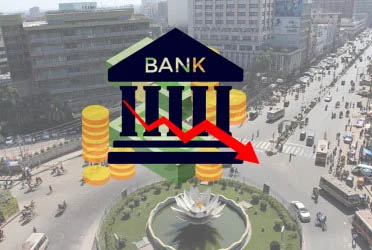Banking sector grapples with unprecedented crisis
- Update Time : Thursday, May 29, 2025

Staff Correspondent:
Bangladesh’s banking sector is grappling with an unprecedented crisis. The list of struggling banks and financial institutions continues to grow, with many unable to return depositors’ money. A combination of capital shortfalls, unchecked loan defaults, and severe liquidity crunch has left the entire sector in disarray.
In a bid to resolve the crisis, Bangladesh Bank is pursuing the merger of several banks and financial institutions. However, sector insiders fear this approach may worsen the situation. They caution that forced mergers are unlikely to yield positive outcomes. Meanwhile, discontent is mounting among business leaders who claim that banks have provided no support over the past nine months.
Despite the central bank governor’s earlier statement that liquidity would not be ensured by printing money, Bangladesh Bank has been compelled to inject over Tk220 billion in liquidity support. Still, the crisis remains unresolved.
Former BIBM Director General Tawfiq Ahmed Chowdhury stated he supports mergers but not if done forcefully. “You are essentially merging one bank’s balance sheet with another—this requires careful integration,” he said.
Governor Dr Ahsan H. Mansur recently announced that six Shariah-based Islamic banks would be merged under the Bank Resolution Ordinance. These include Social Islami Bank, Global Islami Bank, ICB Islamic Bank, EXIM Bank, First Security Islami Bank, and Union Bank.
Former ABB Chairman Nurul Amin criticised the merger plan, saying: “The forensic audits aren’t complete, nor have losses been calculated or valuations done. We support creating larger banks, but combining two weak ones won’t make a strong one.”
Alongside banks, 20 troubled non-bank financial institutions (NBFIs) are also being prepared for consolidation into one or two entities. According to Bangladesh Bank, 83.16% of loans in these NBFIs are defaulted. With deposits totalling Tk221.27 billion, these institutions have racked up Tk234.48 billion in losses.
Under the new banking policy, total defaulted loans reached Tk3.45 trillion as of December 2024. Officials warn this could exceed Tk5 trillion by the end of March 2025. Some banks are already failing to return depositors’ funds.
The severity of the crisis is reflected in a string of resignations by bank managing directors. Most recently, Selim R. F. Hossain stepped down as MD of BRAC Bank, citing an “unworkable environment.”
Governor Dr Ahsan H. Mansur’s comment that some banks are beyond saving has alarmed depositors, prompting many to withdraw funds in a panic. To manage the situation, Bangladesh Bank issued emergency funds to certain banks, despite reiterating it would not print money—an approach it eventually had to abandon.
Business leaders complain that scheduled banks have offered no financial assistance for the past nine months. As a result, many industrialists have been forced to shut down operations or delay new ventures due to a lack of funds.
The Dhaka Chamber of Commerce and Industry has written to the Governor, urging directives for commercial banks to support businesses. Bangladesh Chamber of Industries President Anwar-ul-Alam Chowdhury Parvez even met with the Governor to seek a solution for winding down affected businesses.

















